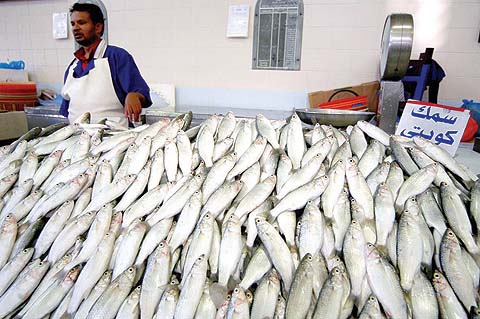KUWAIT: Head of the Kuwait Fishermen Union Thaher Al-Suwayyan has requested Interior Minister Sheikh Talal Al-Khaled Al-Sabah to allow entry permits for expatriate workers, as the industry currently is short of labor and local replacements are not available.
"The Kuwaiti labor market needs more fishing workers because many of the expatriate laborers have left the country and do not intend to return. The necessity of approving applications submitted by the owners of fishing licenses is very important at this juncture, so that they can carry out their national duty by ensuring marine food security for the people of Kuwait," Suwayyan pointed.
He hoped the fishing sector will be able to overcome the challenges facing it, foremost of which is the provision of employment, stressing the importance of concerted efforts for the common good. "Many members of the union applied for new work permits for employing fishermen and they were not answered, either with a rejection or approval. As a result, their files became suspended. Many fishing boats have stopped working due to a lack of fishing workers as no replacement was made for the laborers who left the country," he added.
Meanwhile, head of the Union of Fresh Dairy Producers Abdulhakim Al-Ahmad said: "The agriculture authority lacks long-term plans, and some of its officials work without clear plans that support farmers producing or working in the livestock sector. The sector is suffering due to the lack of experience among leaders and decision-makers."
Ahmad pointed out that the agricultural authority lacks technically qualified and specialized national labor, pointing to the lack of clarity in its plan aimed at increasing animal production or protecting the livestock sector. He added most of the current problems were predicted by the Union of Fresh Dairy Producers before they occurred, but there is no one in the authority to address these issues, he said.
"We predicted the problem of a shortage of livestock feed four years ago without the commission paying any attention to it. This led to a rise in feed prices during the COVID-19 pandemic and the Russian invasion of Ukraine. It also ignored the solutions provided to control the spread of animal diseases, immunity weakness and other veterinary problems," he added.
"It is important that the state provides immunizations and veterinary care for cows and livestock for five continuous years without interruption, in coordination with the finance ministry, who in turn has expressed its readiness to provide funds for all immunizations required by the authority to control epidemics. It also directed the Kuwait Municipality to approve the establishment of dairy factories in the union farms because they are marketing outlets in accordance with the terms and conditions in place," he added.











